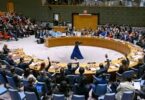According to the media, Japan’s eighth Tokyo International Conference on African Development (TICAD-8) is being held in Tunisian Captial today (Saturday). The conference will be attended by over 5000 scholars, business leaders, technocrats, entrepreneurs, and social activists while more than 30 heads of the state and government will grace the global huddle. Japan’s Foreign Minister Yoshimasa Hayashi will lead the Japanese delegation, while Prime Minister Fumio Kishida will attend remotely after testing positive for Covid-19. According to the Japanese officials, the theme of the conference would be “create a sustainable world together” and Japanese leadership together with African leaders and global partners would deliberate on the measures to provide a sustainable economic and agricultural base to the drought-hit Continent.
Japan is a global economic power, although it had relinquished its imperialist designs after a painful defeat in World War II, however, the Japanese leadership had always been determined in expanding its economic and political influence in other parts of the world. After the end of the cold war when America was conceiving its new world order through military campaigns in the Middle East and diplomatic offensive in Central Asian Republics to establish its strongholds in Moscow’s backyard. Japan decided to regain its self-respect and global prestige through positive engagement with globally neglected Africa and floated an idea of a global economic consortium under its patronage in a bid to expand Japan’s political and economic influence. The United Nations, World Bank, and African Union (AU) also backed the Japanese initiative and became a part of the forum. The TICAD has been working to support regional economies, community building, and the promotion of peace and stability by investment in social and development projects through Japan’s state-owned Japan International Cooperation Agency (JICA) in the past decades.
Interestingly, the People’s Republic of China (PRC) also used the same recipe and invested heavily in various African nations under President Xi’s Belt and Road Initiative. However, the rising Chinese influence created utmost challenges for Japan, which initiated the TICAD program to bring African nations into the Western camp hence Japan and its western allies speed up their investment in the Horns of Africa, Tunis, Kenya, and other states to cement African nations with the western bloc. Similarly, Russian Federation is also working actively to expand its military and economic presence in Africa through the establishment of military bases, investment in the mining industry, and economic aid to regional nations.
Presently, the global rivalry has not only increased the strategic importance of Africa but also brought the continent to the center stage of the global contest. The competing powers are offering different incentives to regional states to lure them into their bloc. The west had denoted millions of doses of the COVID-19 vaccine, economic aid, and facilitated African nations in getting loans from global lenders, Japan allocated $130 million to deliver food, and economic assistance to overcome famine in the region. Whereas, China has introduced industrial development and regional connectivity to enhance its ingress in regional affairs.
In fact, global politics has a unique culture that begins with fascinated phrases and beautiful words to exploit other weaknesses and ends up in the hateful agenda of the influential. Although, world nations are familiar with the tactics of global competitors but lacking a genuine supporter to end their gloominess.






